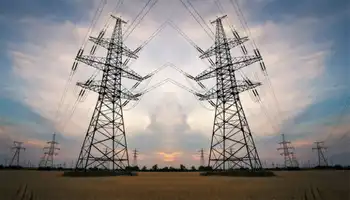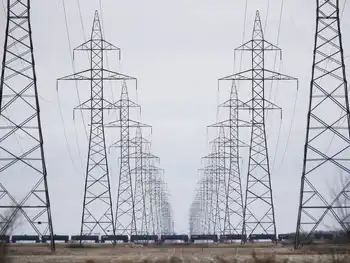Geothermal energy on the rise
By Montreal Gazette
NFPA 70e Training
Our customized live online or in‑person group training can be delivered to your staff at your location.

- Live Online
- 6 hours Instructor-led
- Group Training Available
Use of environmentally friendly and energy efficient ground-source heat pumps, which involves drilling through the earth's crust, has become increasingly popular as a green alternative, especially as fuel prices climb.
The Montreal-based Canadian GeoExchange Coalition - which works with Ottawa to promote, regulate and develop geo-thermal technology and training for government and industry as well as to certify its heating andcooling systems - has watched the domestic so-called earth-energy market expand at a rate of between 40 and 55 per cent annually over each of the past few years compared to 8 to 12 per cent in the U.S.
"Canada is the fastest growing market in the world according to the International Energy Agency," coalition vice-president Ted Kantrowitz said last week after returning from the agency's heat-pump program tri-annual conference in Switzerland.
Although less than one per cent of Canadian homes currently use geothermal energy, which taps into the ground's natural heating and cooling properties, Kantrowitz said: "We see very bright days ahead for this industry."
A study conducted by his coalition found combined sales of residential and industrial-sized geothermal systems across Canada growing considerably - 2006 revenues (the most recent numbers available) totalled about $37.9-million, an increase of 88 per cent over 2004 figures.
The International Ground Source Heat Pump Association lauds geothermal technology as one of the most efficient residential heating and cooling systems available with heating efficiencies 50 to 70 per cent higher than other heating systems and cooling efficiencies 20 to 40 per cent higher than conventional air conditioners.
Despite the start-up costs - a geothermal system is about $20,000 compared to the average $9,600 price for installing a conventional furnace system - the annual savings with earth energy systems usually begin by the third year after installations.
Kantrowitz noted "installation costs can vary significantly based on factors such as soil type, availability of surface or ground water, quality of home insulation, etc."
Homeowners are beginning to appreciate the clean, renewable and efficient benefits of the system.
"I've been installing geothermal systems for the past 20 years or more," said Bob Bourbeau, a local geothermal contractor and consultant. "It's nothing new, just more affordable now."
While he used to deal with a predominantly wealthy clientele in the early days because of the prohibitive costs, "in the past four or five years everyone is doing it and there has been a lot more demand since last year with the introduction of subsidies."
The project director with Tempco Inc., a heating and air conditioning company, said the federal grants combined with Hydro-Québec subsidies can add up to $5,500.
"With a payback in like five years, it's now very reasonable," Bourbeau said.
That was part of the incentive that led Louis Fronenberg to switch.
"It's something I considered right from the start when planning our new home in 2005," Fronenberg recalled. "I had heard a lot of wonderful things about it and our architect Karl Fischer recommended it."
Fronenberg said when he approached municipal authorities with his house plans, "even city hall said it was a wise move" to install a geothermal system.
While he concedes it's "a big initial (financial) output," Fronenberg noted he has already recovered a lot of the initial investment and expects to fully recoup in seven to 10 years.
"In retrospect, it was a really smart move with the cost of fuel now," he added. "It's not just the cost saving, but the quality of air offers a very comfy environment."
Unlike conventional forced-air furnaces that blast hot air, Fronenberg appreciates his system's quiet efficiency: "You don't even know it's there and it doesn't require a lot of energy to keep it running."
"The general rule of thumb in the industry is that the energy required to heat a house is 20 to 30 per cent less" with a geothermal system compared to baseboard electric radiant heating, according to Al Clark of Natural Resources Canada.
The senior adviser and manager of the department's $300-million EcoENERGY Renewable Heat program, which is part of a larger $1.5-billion environmental initiative launched last year, said it takes less electricity to run the pumps, fans and heat exchangers.
To date, 2,131 Quebec homeowners are among 23,371Canadians (5,728 nationally in April alone) who have taken advantage of grants through that program between April 2007 and the end of last March.
Suzanne Deschênes, chief of the department's existing housing programs, said from Ottawa that 102,834 Canadian homeowners (17,018 in Quebec) had pre-retrofit assessments done in the first full year of the ecoENERGY Retrofit program launched April 1, 2007.
At last count, 17,662 (2,546 in Quebec) have completed their retrofits with a national average grant of $1,050 ($1,058 in Quebec).
Deschênes credited those conversions with annual energy savings of 23 per cent along with yearly greenhouse gas reductions of 3.4 tonnes per house a year.
Those federal subsidies range from $200 to $5,000 while Hydro-Québec offers between $2,000 and $6,800 in assistance.
Hydro spokesperson Hélène Laurin said there have been 26 requests (11 for existing homes and 15 for new ones) since the utility began offering subsidies in May 2007.
One of the applicants has so far received a $2,000 grant while one has been refused and the remaining are awaiting certification by the Canadian GeoExchange Coalition to be eligible.
The provincial government's Agence de l'efficacité énergétique also offers financial assistance through its Rénoclimat program.
Rénoclimat project manager Nicolas Belzile said the agency carried out nearly 11,000 first evaluations of single-family homes and 2,150 second appraisals in the 2007-08 fiscal year.
With $150 subsidies for each step totalling $300 toward the total $450 cost of the two evaluations to eligible homeowners in Quebec, Belzile said approximately $6.5 million has been paid out in the past year.











